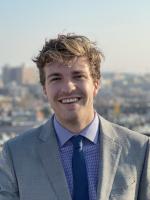
Student Profiles

1 Search Results

Henry Taylor
B.S. Computational Biology, Duke University, 2018
Dr. Francis S. Collins (NHGRI),
Dr. Joshua C. Denny (NHGRI),
and Prof. John Danesh (Cambridge)
Human genetics & genomics, Common disease, Translational medicine
Henry graduated from Duke University magna cum laude with a degree in computational biology in 2018. Initially planning to study at the intersection of technology and conservation biology, he quickly developed a keen interest in utilizing computational models to investigate the underlying mechanisms of human disease. During his sophomore year, he worked with Dr. G. Allan Johnson at the Duke Center for In Vivo Microscopy building computational tools to visualize and analyze 3D computed tomography (CT) and magnetic resonance imaging (MRI) scans from mammalian brain atlases. Following his time in the Johnson lab, he joined the student-led Bass Connections: Enabling Precision Health and Medicine program and worked with Dr. Gregory A. Wray to investigate virulence of Burkholderia cenocepacia in Cystic Fibrosis patients. These experiences, among others, shaped his determination to pursue a career concentrated on connecting biology, mathematics, and computer science, with a focus on applications to human health.
After graduating from Duke, Henry worked as a software engineer in the DC area before joining the laboratory of Dr. Francis S. Collins at the United States National Institutes of Health (NIH) as a postbaccalaureate IRTA fellow. At NIH, he studied the molecular underpinnings of diabetes using genetic and genomic techniques. Notably, one of Henry’s primary projects involved the largest genetic analysis of microRNA expression in human pancreatic islets to date and helped understand the molecular effects of genetic loci associated with diabetes. During his fellowship, he became acutely aware of the health inequities that persist worldwide and pursued training to prepare himself for a career focused on addressing systemic health inequities.
As an NIH Gates Cambridge Scholar, Henry aims to combine his interests in human disease and global health inequities to study the genetic basis of type 2 diabetes (T2D) across diverse ancestries. Ultimately, he hopes that his doctoral research will enhance the treatment and prevention of T2D for all people.
When he is not in the lab, Henry will use any excuse he can to be outdoors. As a result, unlike most people who choose to be remarkably skilled at a few activities, Henry is remarkably average at many activities. He particularly enjoys hiking, camping, traveling to new places, and daydreaming of his semester spent in New Zealand. During his time in Cambridge, Henry also hopes to become an avid football fan.


